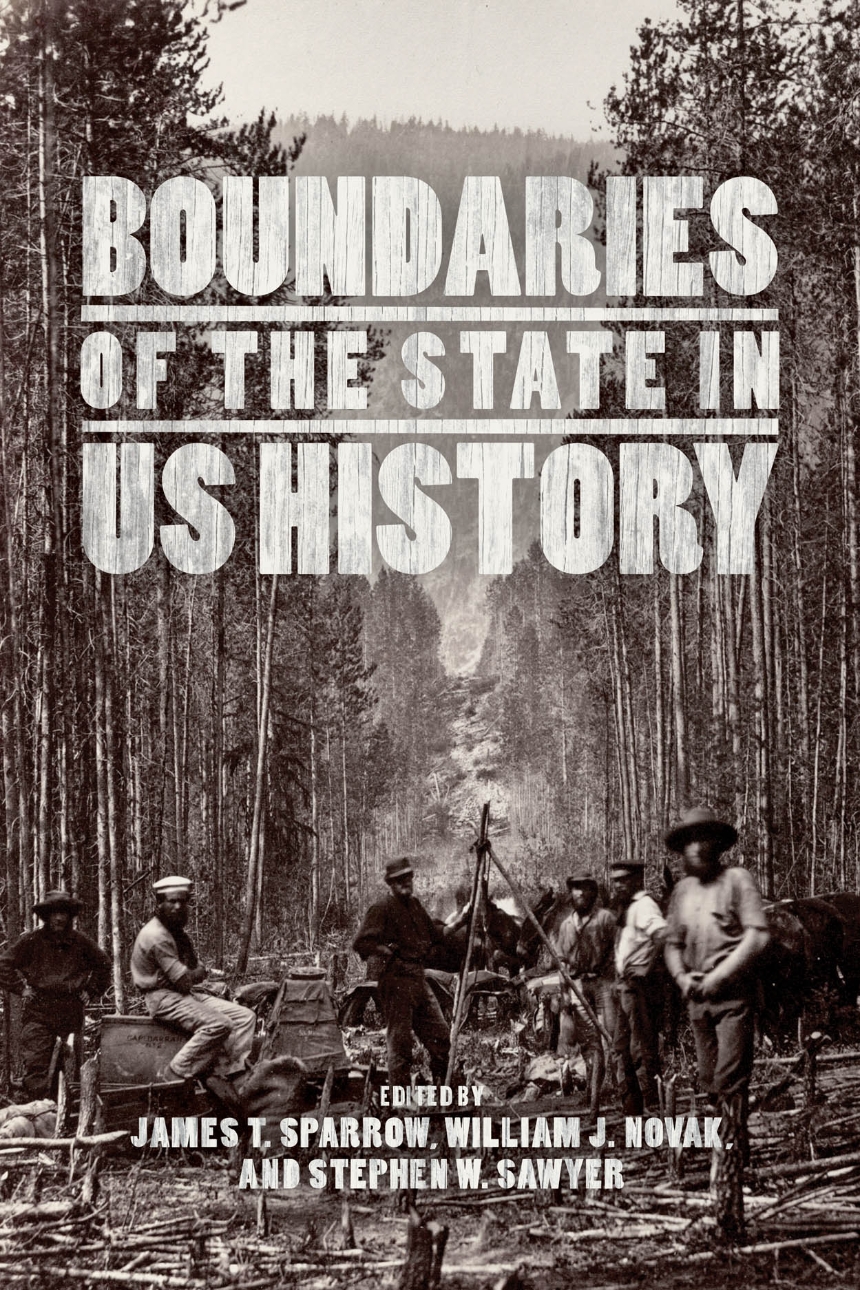Boundaries of the State in US History
The question of how the American state defines its power has become central to a range of historical topics, from the founding of the Republic and the role of the educational system to the functions of agencies and America’s place in the world. Yet conventional histories of the state have not reckoned adequately with the roots of an ever-expanding governmental power, assuming instead that the American state was historically and exceptionally weak relative to its European peers.
Here, James T. Sparrow, William J. Novak, and Stephen W. Sawyer assemble definitional essays that search for explanations to account for the extraordinary growth of US power without resorting to exceptionalist narratives. Turning away from abstract, metaphysical questions about what the state is, or schematic models of how it must work, these essays focus instead on the more pragmatic, historical question of what it does. By historicizing the construction of the boundaries dividing America and the world, civil society and the state, they are able to explain the dynamism and flexibility of a government whose powers appear so natural as to be given, invisible, inevitable, and exceptional.
Here, James T. Sparrow, William J. Novak, and Stephen W. Sawyer assemble definitional essays that search for explanations to account for the extraordinary growth of US power without resorting to exceptionalist narratives. Turning away from abstract, metaphysical questions about what the state is, or schematic models of how it must work, these essays focus instead on the more pragmatic, historical question of what it does. By historicizing the construction of the boundaries dividing America and the world, civil society and the state, they are able to explain the dynamism and flexibility of a government whose powers appear so natural as to be given, invisible, inevitable, and exceptional.
384 pages | 6 x 9 | © 2015
History: American History, History of Ideas
Political Science: American Government and Politics, Political and Social Theory
Sociology: Individual, State and Society
Reviews
Table of Contents
James T. Sparrow, William J. Novak, and Stephen W. Sawyer
Introduction
Part I : The State and the World
Gautham Rao
One / The Early American State “In Action”: The Federal Marine Hospitals, 1789–1860
Stephen W. Sawyer
Two / Beyond Tocqueville’s Myth: Rethinking the Model of the American State
C. J. Alvarez
Three / Inventing the US-Mexico Border
James T. Sparrow
Four / Rumors of Empire: Tracking the Image of Britain at the Dawn of the American Century
Jason Scott Smith
Five / The Great Transformation: The State and the Market in the Postwar World
Part II : The State and Civil Society
Tracy Steffes
Six / Governing the Child: The State, the Family, and the Compulsory School in the Early Twentieth Century
Gabriel N. Rosenberg
Seven / Youth as Infrastructure: 4-H and the Intimate State in 1920s Rural America
Elisabeth Clemens
Eight / Good Citizens of a World Power: Postwar Reconfigurations of the Obligation to Give
Omar M. McRoberts
Nine / The Rise of the Public Religious Welfare State: Black Religion and the Negotiation of Church/State Boundaries during the War on Poverty
Robert C. Lieberman
Ten / Private Power and American Bureaucracy: The State, the EEOC, and Civil Rights Enforcement
Richard R. John
Eleven / From Political Economy to Civil Society: Arthur W. Page, Corporate Philanthropy, and the Reframing of the Past in Post–New Deal America
William J. Novak
Conclusion: The Concept of the State in American History
Acknowledgments
Contributors
Index
Introduction
Part I : The State and the World
Gautham Rao
One / The Early American State “In Action”: The Federal Marine Hospitals, 1789–1860
Stephen W. Sawyer
Two / Beyond Tocqueville’s Myth: Rethinking the Model of the American State
C. J. Alvarez
Three / Inventing the US-Mexico Border
James T. Sparrow
Four / Rumors of Empire: Tracking the Image of Britain at the Dawn of the American Century
Jason Scott Smith
Five / The Great Transformation: The State and the Market in the Postwar World
Part II : The State and Civil Society
Tracy Steffes
Six / Governing the Child: The State, the Family, and the Compulsory School in the Early Twentieth Century
Gabriel N. Rosenberg
Seven / Youth as Infrastructure: 4-H and the Intimate State in 1920s Rural America
Elisabeth Clemens
Eight / Good Citizens of a World Power: Postwar Reconfigurations of the Obligation to Give
Omar M. McRoberts
Nine / The Rise of the Public Religious Welfare State: Black Religion and the Negotiation of Church/State Boundaries during the War on Poverty
Robert C. Lieberman
Ten / Private Power and American Bureaucracy: The State, the EEOC, and Civil Rights Enforcement
Richard R. John
Eleven / From Political Economy to Civil Society: Arthur W. Page, Corporate Philanthropy, and the Reframing of the Past in Post–New Deal America
William J. Novak
Conclusion: The Concept of the State in American History
Acknowledgments
Contributors
Index
